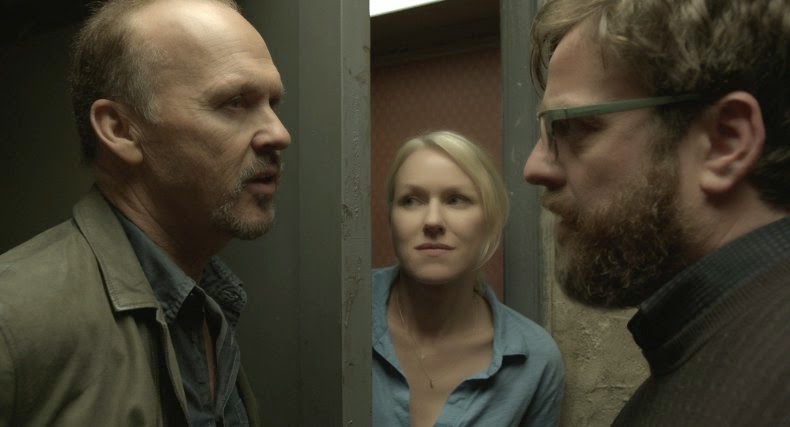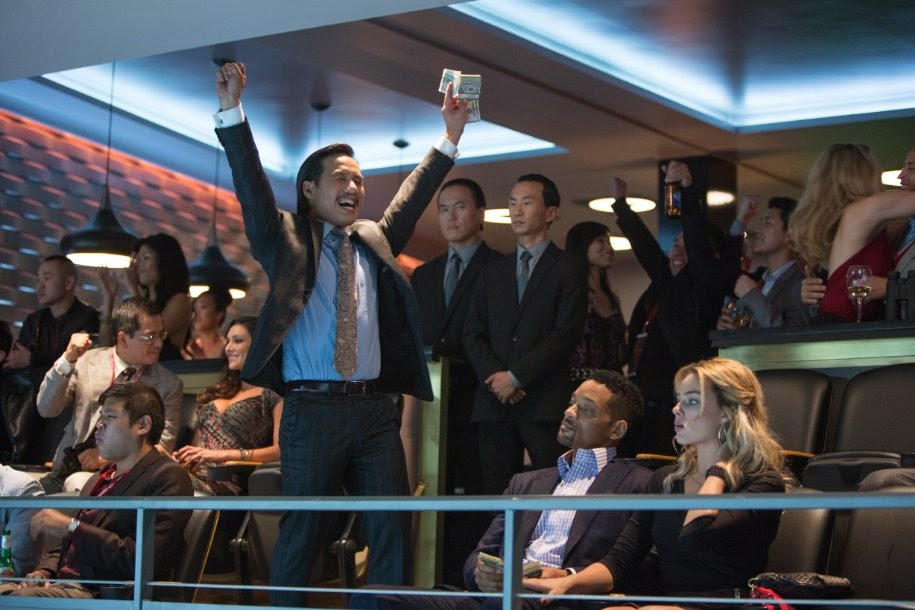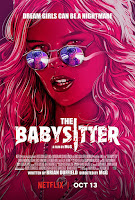Birdman (OR: The Unexpected Virtue of Ignorance)
Birdman (Or: The Unexpected Virtue of Ignorance)
(2014)
A Review by Grant Kanigan
Directed by: Alejandro González Iñárritu
Written by: Alejandro González Iñárritu,
Nicolás Giacobone, Alexander
Dinelaris & Armando Bo
Starring: Michael Keaton, Emma Stone
Zach Galifianakis, Edward Norton
Rating: 14A
Release Date: October 24, 2014
 |
Michael Keaton, Naomi Watts & Zach Galifianakis in Birdman
|
Birdman is set inside the mind of Riggan Thomson, (Michael Keaton), a blockbuster actor who is past his prime. Staging an adaptation of Raymond Carver's What We Talk About When We Talk About Love, Thomson soon finds himself over his head. With the duties that come with being the lead actor, director, writer and producer, Thomson's psyche starts to tear apart at the seams. With the audience's perspective warped by Thomson's mind it's never quite apparent what's real and what's a hallucination. When the co-star of the play is seriously injured by a falling light in the beginning of the film, it's unclear whether Thomson is crazy or just stressed out. By the end of Birdman, it's completely clear the entire film bears witness to a complete schizophrenic breakdown. At face value, the film is about the attempt to get a theatre production from page to stage, however, when one dives into the subtext, there's so much more Iñárritu has to say.
As with the greatest of films, Birdman is a clever mix of tragedy, hilarity and philosophical insight. Often jokes and witticisms turn into full on fisticuffs or screaming matches. A scene between Thomson and his daughter/assistant Sam, (Emma Stone), is heartbreaking when Sam rightfully tears into her father's narcissistic ambitions. Yet, Iñárritu also casts a light on the transcendent motivations behind Thomson's narcissistic need to establish himself as a Broadway actor. Iñárritu argues that all art, that all exhibition of talent, and even all social contact is based on a need to be loved. For some people, a simple smile is often enough. For others, like Thomson, nothing is ever enough, and that, coupled with the obviously schizophrenic and bipolar depression that he suffers from, make his life a living hell. Additionally, by looking outside for love, (of the platonic variety), Thomson never finds it within himself to love himself. It's only by the film's climax that it becomes clear that Thomson alone can determine his own happiness, and that by doing so, allow himself artistic merit and fearless flights into the artistic unknown. With a film so full of philosophy and artistic flourishes, such poetic digression could become pedantic. With Iñárritu behind the wheel, this is not so.
Iñárritu, best known for his epic and bold multi-language film Babel, (try watching Babel without subtitles, the experience is fascinating), and the tragically poetic 21 Grams, finally makes his masterpiece. Fearlessly bringing the experience of theatre to the big screen, Iñárritu demands ferocity and precision from his cast. Keaton, having to go from wily and psychotic to quick and calculated is absolutely brilliant. He's the only actor this year to match the brilliance of Eddie Redmayne in The Theory of Everything and is a serious contender for the best actor Oscar. Emma Stone, who has made a name for herself as a talented comedic actor, displays true emotion here, and in the aforementioned scene of anger towards Keaton, she displays thespian talents far beyond her years. Like Keaton, she is one to watch in the upcoming award season. Edward Norton too, displays a self-aware yet vulnerable side to himself that hasn't been seen yet. It's his best role in decades. Finally, Zach Galifianakis, professional goofball, is brilliant. A polar opposite from his usual work, Galifianakis is bossy, emotional and restrained. It's a role that finally matches his oddball and jazz-like style of stand-up.
The final flash of cinematic genius is Birdman`s cinematography. Emmanuel Lubezki, the inventive cinematographer of Sleepy Hollow, Children of Men, The Tree of Life and Gravity, (all fantastic films, sans Gravity which I will admit, did look beautiful, even if it was the dumbest movie of the decade), has created his magnum opus. Filmed in what's made to look like a single cut, (in reality the film was shot in a couple dozen cuts, with only 16 of them visible), the camera-work is dazzling, vibrant and visceral. The final shots, intentionally reminiscent of Fellini's landmark film 8½, are rousing, emotionally jarring, and wonderfully imaginative. Not only is this the best cinematography in Lubezki's career, it's by far the best of the year.
The only criticism of Iñárritu's Birdman is it's inaccessibility. While I found it absolutely hilarious, heartbreaking, and the poetic flourishes dazzling, the insider status that permeates the film may be off putting to some; it might be hard for some to sympathize with the artistic demons of rich actors while the world is in turmoil. Yet, as it has been for centuries, art is important. It gets to the core of the human soul, and expresses the struggles we all deal with. Why fault ambition if it's not perfect, (although I would argue Iñárritu's film is pretty damn close)? Like Thomson says to a theatre critic, "you write a couple paragraphs and you know what? None of this costs you anything. You risk nothing, this play cost me everything." Iñárritu risks everything and the risks pay off handsomely.
Overall, Birdman and Iñárritu's risk taking are reminiscent of the later works of Leo Tolstoy. Tolstoy, once wrote in What is Art? that art is "that human activity which consists in one man's consciously conveying to others, by certain external signs, the feelings he has experienced, and in others being infected by those feelings [...] also experiencing them." Iñárritu attempts this grand art, and is successful, for Thomson's struggle is as old as time, as Tolstoy also said, "If a man has learned to think, no matter what he may think about, he is always thinking of his own death. All philosophers were like that. And what truths can there be, if there is death?" Birdman answers; there is no truth, only absurdity - and love.
Grant's Rating: 5/5 Stars
Emma Stone and Michael Keaton in Birdman: "Relevant"
Works Cited:
Pevear, Richard, and Larissa Volokhonsky. "Introduction." The Death of Ivan Ilyich and Other Stories. By Leo Tolstoy. New York: Vintage, 2012. III- VII. Print.



Comments